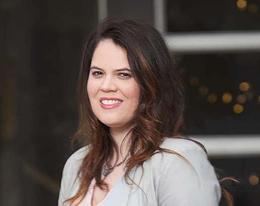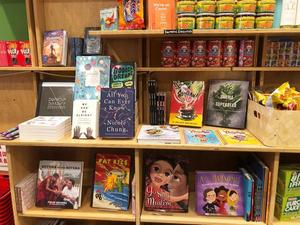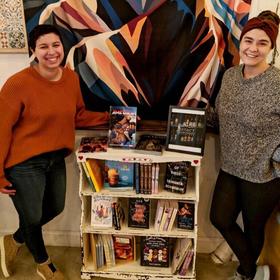Duende District Bookstore, the multicultural, intersectional bookstore founded by Angela Maria Spring in 2017, made its debut as a pop-up shop at the Artomatic Festival in the Washington, D.C., area last spring. At the time, Spring had the intention of eventually transitioning to a more traditional bricks-and-mortar model. But now, roughly two years later, Spring has chosen instead to focus on opening pop-up shops throughout D.C. and around the country.

|
|
| Angela Maria Spring | |
"The thing I really like to do is partner with different organizations and businesses and bring the mission to people who believe in it," said Spring, adding that while she hasn't ruled out owning a bricks-and-mortar of her own someday, opening a new store in D.C. would be very challenging. "It's given me a whole new side of bookselling."
At present, Duende District has pop-up stores in the D.C. area at Toli Moli, a Burmese eatery/bodega, the National Museum of Women in the Arts gift shop, the bookstore Walls of Books and the Latinx-owned wine bar Dio. And earlier this year, Spring opened a pop-up in Red Planet Books & Comics, a Native American-owned book and comic shop in Albuquerque, N.Mex., which was her first Duende District location outside of the greater D.C. area.

|
|
| Duende District's pop-up at Toli Moli in Union Market. | |
Spring reported that at Toli Moli she has about six shelves, and roughly the same amount at Dio. At Red Planet she has only a couple of shelves, while at Walls of Books she has two bookcases, which makes it her largest pop-up. Spring emphasized that "what we do is curation," and said she probably wouldn't want a space much larger than what she has at Walls of Books in future pop-ups. She added that one of her favorite parts about starting a new pop-up is figuring out the right book mix and what resonates best with new customers.
She explained that the majority of her pop-ups operate on a model where she splits a percentage of the profit from her book sales with the venue owner. She noted that this model isn't "hugely profitable" for her, but she is in the black and, as she opens more pop-ups, the additional volume helps. At Walls of Books, meanwhile, Spring uses a slightly different model, in which she pays a small monthly fee plus a very small percentage share of any books sold. The reason for this, she said, is because she frequently uses the Walls of Books space for her events.
When asked about any recommendations she would give to booksellers interested in the pop-up model, Spring answered that she would advise against doing consignment, as it "doesn't pay off" when the inventory is so small. Spring suggested that booksellers factor in their own salary when figuring out overhead costs for a pop-up. "Even if you're not really paying yourself," she said, "put the calculation in there."
 |
|
| Duende District at Dio Wine Bar: (l.) Nicole Capo of Duende District DC and (r.) Dio owner Stacey Khoury-Diaz. | |
She also warned pop-up booksellers to be very careful with things like book festivals, which can often charge fees of $300 or more. She stressed the importance of weighing the costs and benefits of those kinds of events and especially of figuring out if it is the sort of event where customers actually expect to buy books. Despite some of the risks, Spring said she has done great at several book fairs in the past, but a major part of that was choosing the right fairs.
"If you're going to have to put up money to do it," Spring said, "be very mindful and thoughtful and specific as to why."
In addition to her pop-up bookselling, Spring also works as a consultant. Essentially, she uses her curatorial skills as a bookseller to create lists of books by and about people of color for individuals or organizations. For her consultancy fee she charges a much higher wage than what she factors into her pop-up overhead as a salary for herself. Consulting not only helps cover the pop-up shops, she said, but also has helped her recognize the value in what she does as a bookseller.
"This is particularly a problem for people of color but also booksellers--we really undervalue what we do," said Spring. "I know that what I do is very specialized, but for all booksellers, there is a lot of value in what we do. If we think outside our normal book box, people are willing to pay us for what we do." --Alex Mutter

